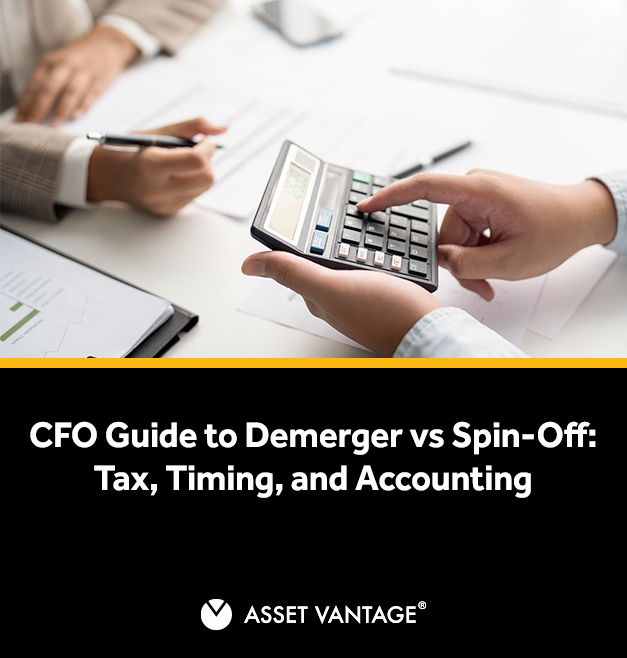Read Time13 Mins
Understanding The Separation Spectrum
Corporate separations reshape how businesses allocate ownership, cash flow, and control. For a CFO, understanding this spectrum is the foundation for any restructuring decision. Each form of separation, demerger, spin-off, split-off, and carve-out, translates strategic intent into a distinct legal and financial outcome. The right choice determines not only reporting clarity but also the flow of value to shareholders, lenders, and management.
Key forms within the separation spectrum:
- Demerger: Transfers assets and liabilities into a new entity while retaining proportional ownership, often to ring-fence risk or regulatory exposure.
- Spin-off: Distributes shares of a subsidiary directly to existing shareholders, creating a new listed company without cash exchange.
- Split-off: Allows shareholders to swap parent shares for subsidiary shares, thereby tightening control and aligning ownership.
- Carve-out: Raises liquidity by selling a minority stake in a subsidiary through an IPO while the parent maintains majority control.
Each approach redistributes capital and accountability differently. A clear grasp of these structures enables CFOs to link structural choices to performance reporting, tax efficiency, and long-term shareholder confidence.
Demerger, Spin-Off, Split-Off, And Carve-Out At A Glance
When a parent company creates a new entity or reorganizes a business unit, the goal is not merely structural. It is strategic.
Separations help management simplify complexity, align capital with growth priorities, and give investors clearer visibility into each business line’s performance.
Each route, demerger, spin-off, split-off, or carve-out, uses a different mix of ownership transfer, control, and cash flow to achieve that end. The form chosen determines how shareholder value is recorded, taxed, and sustained.
| Structure | How Ownership Moves | Cash Flow Impact | Control After Separation | Typical Use Case |
| Demerger | Existing shareholders hold the same proportion in both companies | No cash involved | Parent and new entity remain aligned through shared governance | When asset segregation is needed for clarity or regulation |
| Spin-off | Shareholders receive the subsidiary’s stock automatically from the parent company | No cash transaction | New company operates independently | When the subsidiary can grow faster on its own balance sheet |
| Split-off | Shareholders exchange parent shares for new entity shares | No new cash raised | Ownership base becomes more focused | When the group wants targeted ownership or capital structure simplification |
| Carve-out | Parent sells minority stake via IPO or private placement | Cash inflow to parent | Parent retains majority control | When liquidity is needed without full separation |
Each structure changes how markets perceive value and how the balance sheet captures it. What distinguishes them is not only ownership transfer but also the intent behind it, whether the parent company seeks regulatory clarity, capital liquidity, or strategic independence. Understanding these motivations sets the stage for examining each structure in depth, starting with the demerger.
What Is A Demerger
A demerger creates a separate entity by transferring defined assets and liabilities into a new company. Ownership typically mirrors the parent’s existing shareholding, preserving governance alignment. This approach helps isolate risk, improve regulatory visibility, and provide investors with transparent performance of distinct business lines.
What Is A Spin-Off
In a spin-off, the parent company distributes shares of its subsidiary to existing shareholders, forming an independent company without cash changing hands. The spin-off company gains autonomy in capital allocation, while shareholders benefit from exposure to two focused businesses. This structure works best when the subsidiary’s strategy or growth profile differs materially from the parent’s.
What Is A Split-Off
A split-off invites shareholders to exchange part or all of their parent company shares for shares in a subsidiary. It effectively lets investors choose which business they want exposure to. This route narrows the shareholder base to those aligned with each company’s direction and often simplifies future capital decisions.
Why Carve-Outs Matter In Restructuring
An equity carve-out raises liquidity by selling shares in a new subsidiary while the parent keeps control. It delivers capital without losing command. It aligns capital needs with market access while maintaining ownership and control.
A carve-out gives markets a price signal for a business unit’s value and helps management assess investor appetite before a full separation. It brings outside capital, strengthens leverage ratios, and adds transparency to performance that was once buried within consolidated results.
Unlike a spin-off or demerger, it keeps reporting, governance, and strategy linked to the parent. That continuity protects synergies while freeing capital for new investments or debt reduction.
Example: Siemens carved out its healthcare division into Siemens Healthineers, raising capital, improving its balance sheet, and retaining majority ownership. The move showed how a carve-out can fund growth, preserve control, and test readiness for eventual independence.
Strategic Logic Behind Separation
Boards separate multiple businesses to reduce complexity, sharpen focus, and align structure with valuation signals investors actually price.
Separation is not about division.
It is about precision.
When a parent company identifies business units with distinct growth cycles, regulatory exposure, or capital needs, creating independent structures allows each to be valued on its own fundamentals. The right separation design improves reporting clarity, strengthens accountability, and reveals the proper drivers of overall financial performance across the group.
Strategic Reasons Companies Separate
Simpler operations, cleaner ownership, and tax efficiency often translate into higher market confidence. These actions boost shareholder trust when one company houses competing growth profiles or uneven earnings cycles. In some cases, separation follows an earlier merger that achieved scale but now demands governance suited to distinct business models. A clear structure also helps management align incentives, funding, and performance targets to each entity’s strategy.
| Driver | Impact on Value | Measurement Lens |
| Reduced complexity | Easier performance comparison | Segment-level profitability |
| Focused management | Sharper capital allocation | Return on invested capital (ROIC) |
| Regulatory clarity | Lower compliance risk | Cost of capital stability |
| Tax efficiency | Improved net earnings | Effective tax rate trend |
| Valuation transparency | Accurate market pricing | Sum-of-the-parts (SOTP) valuation |
When A Demerger Works Better
A demerger works best when certain assets or liabilities require ring-fencing for regulatory, tax, or lender comfort. Demerger accounting supports clear asset segregation and ensures each balance sheet carries only its relevant risk. A partial demerger also allows the group to retain operational synergy while giving investors visibility into separate earnings streams and governance oversight.
How A Spin-Off Company Unlocks Shareholder Value
A spin-off company can trade at a higher market value once investors price a standalone strategy, improved profitability, and capital discipline. By separating a fast-growth business unit from a slower one, management clarifies how cash generation and reinvestment differ. The spin-off company often benefits from its own cost of capital, tailored leadership, and a focused investor base, all of which contribute to stronger shareholder value creation.
When A Spin-Off Creates Long-Term Shareholder Value
Long-term value emerges when separation improves control and capital allocation, not just market optics. Distinct ownership and management accountability allow each company to pursue a strategy suited to its growth rhythm. Over time, this clarity strengthens financial performance, stabilizes cash flow, and sustains investor confidence through transparent governance and measurable returns.
Accounting Mechanics And Financial Reporting
Accounting entries turn a structural decision into measurable financial outcomes. Every separation must translate ownership and asset movement into numbers that auditors, investors, and boards can reconcile with confidence. Clarity here determines how the market perceives the transaction and whether post-separation performance reflects the true economics of each entity.
Mechanics Of Asset And Liability Transfer
The foundation of transparent reporting lies in accurate identification of what moves between entities. The parent company defines which assets, liabilities, and capital accounts are transferred to the new entity and records them at carrying value unless fair-value adjustments are required. Recording this transfer correctly ensures the new balance sheet reflects economic substance, not just form. Both the parent company and the recipient entity must mirror entries so that debits, credits, and opening balances reconcile on day one. Where the parent company receives consideration, record the instrument explicitly and map the proceeds to equity or debt reduction in accordance with the stated policy.
| Step | Accounting Focus | Outcome |
| Identify assets and liabilities | Define scope and valuation basis | Transparent allocation of resources |
| Record transfer entries | Recognize derecognition from parent; recognition in subsidiary | Clean audit trail for regulators |
| Validate consideration | Confirm whether cash, shares, or notes are exchanged | Clarity on liquidity and control impact |
Demerger Accounting Treatment
In a demerger, the parent company reclassifies equity and derecognizes the transferred portion of assets and liabilities. Comparative periods are restated so that analysts can measure the new entity’s earnings trend without distortion. This treatment supports visibility into performance for business units previously buried within consolidated statements. Newly created entities should lock opening policies and measurement bases at the transfer date to preserve comparability across periods.
| Item | Parent Company Treatment | New Entity Treatment |
| Assets transferred | Derecognized from books | Recognized at carrying value or fair value |
| Liabilities transferred | Removed from parent’s obligations | Recorded as new entity’s commitments |
| Equity adjustment | Reduction in retained earnings or reserves | Corresponding increase in share capital |
Spin-Off Accounting Treatment
In a spin-off, the parent company records the issuance of new shares and the distribution of the subsidiary’s stock to existing shareholders. The carrying amount of the net assets transferred is removed from the consolidated financials, and any difference between carrying value and fair value is recognized in equity. Proper disclosure ensures investors understand that control has shifted even when no cash transaction occurs.
| Item | Parent Company Treatment | Spin-Off Company Treatment |
| Net assets | Derecognized from consolidation | Recognized as opening balances |
| Shares issued | Reflected as a distribution to shareholders | Recorded as share capital |
| Control impact | Ceases consolidation | Treated as a separate reporting entity |
Consolidation And Reporting Post-Separation
After separation, both entities must present financial statements that clearly distinguish continuing operations from discontinued segments. The parent reports comparative results to maintain continuity in earnings analysis, while the new entity establishes its own reporting cycle. Consistent policies for valuation, depreciation, and revenue recognition prevent mismatched disclosures that could undermine investor confidence. Clear note-level narratives help industry experts and analysts connect the structural change to operating metrics and trend lines.
Transparent accounting is not only a compliance requirement but also a governance signal. When demerger accounting and spin-off accounting are executed with precision, financial statements reflect substance, tax treatment aligns with intent, and shareholder trust grows from demonstrable integrity in reporting.
Tax, Capital, And Legal Framework
Eligibility, jurisdiction, and capital policy together determine whether value is preserved tax-free or lost to leakage. These factors link legal structure to real cash outcomes. A sound framework helps CFOs manage both sides of the transaction: tax efficiency at separation and covenant safety afterward. Every decision must balance regulatory compliance, investor optics, and long-term capital flexibility.
Tax-Free Qualification Tests And Examples
A transaction remains tax-free only when the eligibility criteria on purpose, continuity, and proportionate ownership are met. Substance, not form, drives tax treatment; each jurisdiction applies its own continuity-of-interest tests and business-purpose standards.
Timing is equally critical. If execution drifts beyond a defined window, deferred-tax recognition may trigger leakage. Tax-free eligibility is always conditional; meeting certain conditions on ownership continuity, timing, and strategic intent ensures that the separation reflects genuine business purpose, not tax arbitrage. The Synchrony Financial separation from GE illustrated how aligning purpose, ownership, and timing can preserve tax-free status while meeting regulatory disclosure standards.
| Condition | Test Objective | Practical Implication |
| Continuity of ownership | Ensure shareholders of the parent maintain a proportional stake | Prevents gaining recognition on separation |
| Business purpose | Confirm separation has a valid strategic rationale | Protects eligibility for tax-free status |
| Timing and substance | Align the transaction calendar with the statutory windows | Avoids reclassification as a taxable distribution |
Jurisdiction And Cross-Border Complications
Each jurisdiction applies unique participation exemptions, anti-inversion rules, and exchange controls. In multi-country structures, inconsistent recognition of gains or capital transfers can create phantom income or unrelieved withholding tax. Early alignment with legal and accounting advisors allows both the parent company and the new entity to document substance before filings. Structured planning at this stage prevents surprise taxation on what would otherwise be neutral transfers.
Capital Policy, Debt Allocation, And Covenant Headroom
Capital policy decisions define post-separation resilience. Allocating debt between entities affects leverage ratios, credit ratings, and dividend capacity. A disciplined debt allocation plan considers cash inflows, refinancing schedules, and covenant headroom across both entities. The parent company should model multiple capital scenarios, repurchase programs, special dividends, or retained earnings, to ensure liquidity supports both growth and compliance.
| Focus Area | CFO Decision | Outcome |
| Debt allocation | Distribute borrowings aligned with EBITDA contribution | Balanced leverage and covenant headroom |
| Dividend or buyback plan | Match payout to post-deal liquidity | Sustainable capital returns |
| Credit facility redesign | Negotiate limits and guarantees early | Avoid post-transaction covenant breaches |
Integrated tax, capital, and legal planning ensures that every separation delivers durable value. When eligibility, jurisdiction, and capital policy are addressed together, both the parent company and the newly created entity operate with clear headroom and investor confidence.
Governance, Timing, And Disclosure Discipline
Ownership design, execution calendar, and plain disclosures anchor credibility after separation. Governance quality determines how effectively each entity earns investor trust and sustains valuation. Clear documentation of control, capital allocation, and reporting obligations keeps auditors, regulators, and shareholders aligned. The goal is to make the separation look deliberate, not reactive, so confidence in both management teams strengthens from day one.
Ownership, Control, And Board Architecture
Governance begins with clarity in who controls what. Boards must reset voting rights, non-voting shares, and committee structures so management accountability is visible across the two companies with linked histories. Both the parent company and the newly created entity should review charter documents, related-party policies, and performance-linked compensation frameworks to ensure continuity with independence. Defined ownership thresholds and conflict protocols safeguard fairness and protect minority shareholders.
| Governance Area | Purpose | Desired Outcome |
| Board composition | Balance legacy experience with new independence | Objective decision-making |
| Voting rights | Clarify control and investor influence | Transparent shareholder structure |
| Audit and risk committees | Reinforce accountability for disclosures | Improved investor confidence |
Timing And Market Windows
Timing drives perception. Quarter closes, liquidity cycles, and market guidance windows shape how investors price the transaction. Poor timing can dilute the benefit of even the most tax-efficient structure. Boards should model multiple timelines and select execution windows that optimize liquidity, trading momentum, and alignment with disclosure. Coordination between audit sign-off, analyst briefings, and exchange approvals helps ensure stable trading post-separation.
Effect On EPS, Equity Stake, And Returns
Financial clarity completes governance discipline. CFOs must model share counts, equity stake shifts, and new shares to ensure reported EPS and investor returns capture real economics, not presentation optics. Adjusting for new shares and shares held after the transaction preserves ownership continuity and avoids misleading comparisons. Both entities should publish reconciliation tables that link pre- and post-separation results so analysts and industry experts can trace how performance evolved.
Transparent ownership structures, realistic timing, and disciplined disclosure build credibility that markets reward. When governance and timing work together, separation signals control, confidence, and consistency, core ingredients of lasting shareholder value.
Comparing Options Head To Head
Turning definitions into decisions is where strategy meets execution. Side-by-side evaluation helps a CFO see how each separation structure changes ownership, liquidity, and reporting visibility. Operator filters, tax, timing, accounting, control, and liquidity convert abstract terms into measurable trade-offs. A straightforward comparison ensures that the chosen form strengthens value, credibility, and post-transaction performance.
Demerger vs Spin-Off Operational Comparison
Demerger vs. spin-off determines who holds which stock, how cash and control are distributed, and what each structure implies for tax efficiency. The key differences lie in how ownership transfers, how cash is recorded, and whether shareholders receive or exchange stock. In a spin-off, shareholders receive shares of the subsidiary as a non-cash distribution, which must be valued correctly to ensure accurate equity and tax reporting. These corporate actions reshape how investors perceive value by realigning management accountability and ownership structures.
| Criterion | Demerger | Spin-Off | CFO Lens |
| Ownership | Shareholders retain the same proportion in both entities | Shareholders receive subsidiary shares directly | Stability vs. independence |
| Cash flow | No cash transaction | No cash exchange; distribution of the subsidiary’s stock | Liquidity neutral for both entities |
| Control | Parent retains aligned governance | New company gains autonomous board | Oversight vs. autonomy |
| Tax treatment | Often qualifies as tax-free if conditions are met | Typically, tax-free under continuity rules | Maintain eligibility through timing accuracy |
| Accounting | Assets and liabilities derecognized and reclassified | Shares issued; new entity deconsolidated | Accuracy in equity and earnings reconciliation |
| Investor perception | Shows regulatory discipline | Signals growth clarity | Both enhance transparency differently |
Advantages And Disadvantages Of Each Structure
Each structure serves a distinct strategic purpose. Spin-offs can be faster, market-driven, and tax-efficient when investor appetite is strong. Demergers can ring-fence certain assets, manage risk exposure, and maintain synergy where interdependence still matters. A CFO’s choice depends on whether the goal is to simplify oversight, access capital, or isolate regulatory obligations.
| Parameter | Demerger Advantage | Spin-Off Advantage | Key Trade-Off |
| Speed | Lower execution risk with regulatory alignment | Quicker listing and market visibility | Cost vs. time to value |
| Tax | Predictable treatment if documentation is strong | Clean separation under continuity rules | Compliance rigor |
| Control | Maintains governance consistency | Grants management independence | Oversight balance |
| Valuation | Reflects asset base stability | Reflects standalone growth prospects | Capital market focus |
| Complexity | Simpler to structure domestically | Easier cross-border execution | Legal environment |
Decision Filters For CFOs
Use five decision filters to select the right form:
- Tax: Does the structure qualify as tax-free under prevailing continuity and business-purpose rules? Tax benefits from both structures depend on how purpose and continuity tests are documented and disclosed, especially when transactions aim to remain tax-free across multiple jurisdictions.
- Timing: Can execution align with quarter close, liquidity, and disclosure windows?
- Accounting: Are reclassification entries, share counts, and EPS reconciliations complete?
- Control: Is the ownership design clear enough to avoid ambiguity in voting or board oversight?
- Liquidity: Will the market absorb new shares or cash flow shifts without pricing dislocation?
Applying these filters converts comparison into accountability. It ensures both the parent company and the newly created entity operate with clarity and capital discipline.
Modeling Cash, Tax, And Control Together
Integrating accounting entries, tax effects, and ownership outcomes in a single workbook prevents financial drift between operations and capital markets. Modeling the interactions among cash, equity, and tax flows provides CFOs with a clear forecast of covenant headroom and dividend capacity. This exercise also quantifies how each form, demerger or spin-off, affects funding flexibility, shareholder returns, and valuation consistency.
| Model Element | Data to Capture | Objective |
| Cash flow mapping | Inflows, outflows, and intercompany funding | Verify liquidity coverage post-separation |
| Tax impact | Deferred, current, and withholding effects | Confirm tax-free eligibility and leakages |
| Ownership and control | Shareholding matrices and governance resets | Validate reporting alignment |
| Earnings reconciliation | EPS, equity stake, and share adjustments | Preserve comparability for investors |
When modeling integrates tax, timing, accounting, and control, separation decisions move from conceptual to quantitative. The outcome is a structure that sustains investor trust, aligns operations with capital markets, and preserves long-term shareholder value.
Managing Risk And Post-Transaction Reality
Execution discipline prevents avoidable value loss once the structure is chosen. The period after a demerger or spin-off tests whether reporting, governance, and cash controls were designed with enough foresight. CFOs must anticipate not just the transaction’s success but its operational resilience once both entities begin independent reporting and funding cycles. Once the transaction closes, both separate companies must operate under aligned governance policies to maintain consistency in disclosure, audit, and investor communication.
Common Mistakes That Destroy Value
Weak substance, misstated assets, or missed filings can forfeit tax-free status and invite regulatory scrutiny. Repair is costly once stock trades and disclosures are public. Errors often arise from underestimating documentation requirements, misaligning valuation dates, or failing to synchronize accounting policies across entities. Sustaining tax benefits requires early alignment among auditors, advisors, and compliance teams before separation is finalized.
Cross-Border Traps In Complex Structures
Mismatched fiscal calendars and transfer-pricing gaps can derail approvals in multinational reorganizations. Local tax authorities assess whether allocations match real substance, not just paper movements. Early planning across jurisdictions helps prevent withholding exposures and avoids deferred tax volatility. Coordinating audit sign-offs, valuation reports, and regulatory filings across time zones keeps both the parent company and the newly created entities compliant and predictable.
Operational Contracts And Third-Party Consents
Operational continuity determines whether post-separation performance holds. Uninterrupted business operations are the strongest signal to investors that separation was well-planned and financially stable. Consent from every supplier, customer, and lender should be secured before legal closing so invoicing, payment terms, and service levels can continue seamlessly. When the parent company receives third-party approvals in advance, counterparties remain confident, and credit lines stay uninterrupted. Contract migration schedules, digital signature tracking, and joint communication plans reduce the risk of disputes or payment delays.
Portfolio Visibility And Look-Through Analysis
Post-spin visibility prevents hidden clustering across wrappers, SPVs, and funds. CFOs and asset managers should ensure that the same exposure does not reappear under different entities within consolidated portfolios. Maintaining line of sight into holdings through look-through analysis strengthens risk oversight and capital allocation discipline.
Look-Through Analysis After Separation
Tracing holdings through SPVs and investment funds reveals overlaps that a top-level registry can hide. Both entities must review fund exposures quarterly to detect concentration patterns early. Clear reporting templates and system linkages enable analysts and industry experts to track portfolio movements and align asset classifications with actual risk.
Concentration Risk In Mutual Funds And PE Chains
Shares in the new entity may land in the same wrappers or index-linked portfolios, creating unintended concentration. Rebalancing avoids overexposure that can creep in as indexes and funds adjust their weights. Ongoing monitoring across mutual funds and private equity chains ensures that diversification policies remain intact after separation.
Family Office Implications And Portfolio Oversight
Family offices face unique post-spin challenges when ownership continues across multiple entities. Institutional investors may choose to continue holding shares in both entities when the underlying fundamentals and dividend policies remain aligned. They must decide whether to hold or rebalance, depending on liquidity, tax efficiency, and governance objectives. Look-through reporting provides clarity on where exposures build up by sector, region, or instrument type. This visibility ensures that asset allocation aligns with the mandate and risk tolerance while preserving transparency for beneficiaries.
Disclaimer
This article is provided for informational and educational purposes only. It does not constitute accounting, tax, legal, or investment advice, nor should it be relied upon as a substitute for consultation with qualified professional advisors. Examples and references are illustrative and may not apply to all jurisdictions or corporate structures. Readers should seek independent advice before making financial or strategic decisions related to demergers, spin-offs, or any other corporate actions.







